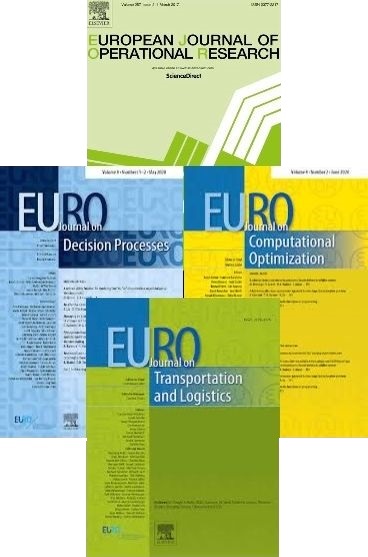EURO Journal on Computational Optimization
Call for Papers
Special Issue: Optimization Challenges in Data Science
The recent surge of breakthroughs in data science and machine learning has brought to the forefront the fundamental role of optimization: almost all machine learning models can be viewed as solutions to optimization problems, and even when a machine learning technique has its roots in other fields, optimization provides the necessary computational backbone to render it implementable. The aim of this special issue will be to explore the challenges that arise at the interface of data science, optimization and learning theory, with a particular focus on optimization algorithms capable of treating high-dimensional problems in a distributed and efficient manner. The call is only open to the participants of this year's 31st EURO Conference in Athens and the 18th EUROPT Workshop on Continuous Optimization.
Guest editors:
- Coralia Cartis, Associate Professor, Mathematical Institute, Oxford University, United Kingdom. Email: cartis@maths.ox.ac.uk
- Panayotis Mertikopoulos, Principal Researcher, Laboratoire d’Informatique de Grenoble, French National Centre for Scientific Research (CNRS), Grenoble, France. Email: panayotis.mertikopoulos@imag.fr
Special issue information:
The recent emergence of several disruptive paradigms in data science and machine learning – from deep learning to generative models – has likewise brought to the forefront an array of formidable challenges for optimization theory and its applications to the field. As an example, when the data of a particular model is distributed over many machines, learning algorithms and methods are confronted with the challenges of uneven data distribution, diverse computation loads, and costly communication between machines. Similarly, the immense scale of current and emerging machine learning models requires the design and analysis of novel dimensionality reduction techniques that are able of capturing the structure of the underlying optimization problem to produce computationally efficient methods. Finally, despite the great practical successes obtained by the adversarial match-up of deep learning mechanisms – e.g., as in the case of generative adversarial networks – our theoretical understanding of these models is still at an embryonic stage (as is our capability of reliably predicting the outcome of training such a model). This SI welcomes both original research works and surveys on the interface of optimization and data science, with a particular focus on the challenges identified above. In more detail, possible topics include (but are not limited to):
- First- and zeroth-order methods for continuous optimization
- Tensor methods and scalable higher-order algorithms
- Stochastic and/or non-smooth methods
- Dimensionality and variance reduction techniques
- Min-max optimization and game theory
- Variational inequalities
- Robust and bilevel optimization
- Adaptive and parameter-free methods
- Applications of computational optimization to data science, statistics, and machine learning
- Mathematical methods and models of operations research
Manuscript submission information:
You are invited to submit your manuscript at any time before the submission deadline of 10 January 2022. For any inquiries about the appropriateness of contribution topics, please contact Assoc. Prof. Coralia Cartis via cartis@maths.ox.ac.uk.
The journal’s submission platform (Editorial Manager) is now available for receiving submissions to this Special Issue. Please refer to the Guide for Authors to prepare your manuscript, and select the article type of “SI: Challenge Data Science” when submitting your manuscript online. Both the Guide for Authors and the submission portal could be found on the Journal Homepage here:
http://www.elsevier.com/locate/issn/2192-4406
All the submissions deemed suitable to be sent for peer review will be reviewed following due process as usual EURO Journal on Computational Optimization submissions. Upon its editorial acceptance, your article will go into production immediately. It will be published in the latest regular issue, while be presented on the specific Special Issue webpage simultaneously. In regular issues, Special Issue articles will be clearly marked and branded.
Keywords:
Continuous optimization, machine learning, computational learning theory, game theory
Why publish in this Special Issue?
- Special Issue articles are published together on ScienceDirect, making it incredibly easy for other researchers to discover your work.
- Special content articles are downloaded on ScienceDirect twice as often within the first 24 months than articles published in regular issues.
- Special content articles attract 20% more citations in the first 24 months than articles published in regular issues.
- All articles in this special issue will be reviewed by no fewer than two independent experts to ensure the quality, originality and novelty of the work published.
Learn more about the benefits of publishing in a special issue: https://www.elsevier.com/authors/submit-your-paper/special-issues
Interested in becoming a guest editor? Discover the benefits of guest editing a special issue and the valuable contribution that you can make to your field: https://www.elsevier.com/editors/role-of-an-editor/guest-editors

This work is licensed under a Creative Commons Attribution-ShareAlike 3.0 International License and the GNU Free Documentation License (unversioned, with no invariant sections, front-cover texts, or back-cover texts).
